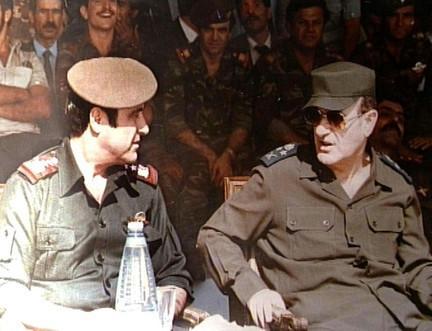French graft trial looms for uncle of Syria’s Assad
PARIS

The uncle of Syrian President Bashar al-Assad alone accounts for 80 percent of the assets seized by French customs authorities last year as a four-year probe into his eye-popping assets in Europe winds up.
Dubbed the “Butcher of Hama”, Rifaat al-Assad, now 80, may soon face trial over his allegedly ill-gotten gains valued at tens of millions of euros, according to sources close to the case.
He headed an elite force that put down a Sunni insurrection in the central city in February 1982, a crackdown that claimed between 10,000 and 40,000 lives, according to varying estimates.
Two years later, he fled the country after mounting a failed coup bid against his brother Hafez al-Assad, Bashar’s father, who led Syria from 1971 to 2000.
After he arrived in Europe, Rifaat al-Assad’s lavish lifestyle with four wives and a dozen children soon raised eyebrows.
The breadth of Assad’s alleged fortune, amassed mainly during the 1980s, is dizzying: more than 500 properties in Spain; two mansions in Paris including one covering 3,000 square meters; a stud farm and chateau near the French capital; 7,300 square meters of office space in Lyon.
Most of these were acquired through offshore companies in Panama, Curacao, Liechtenstein, Luxembourg and Gibraltar.
In France alone, his fortune has been valued at 90 million euros ($110 million).
Most of the assets have been sequestered.
Last year, of the 862 million euros confiscated by French customs authorities, 691 million euros’ worth belonged to Assad, they said in March.
The family is also thought to have been the owners of Witanhurst, the largest residence in London after Buckingham Palace, through a shell company in Panama, before selling it in 2007.
A source close to the case said a former manager in France described how “it was raining cash” from 1996 to 2010, recalling that he withdrew around 100,000 euros a month to pay the Assads’ many employees.
French authorities opened an investigation in April 2014 after two anti-graft groups, Sherpa and Transparency International, raised red flags.
Two years later, they charged Assad with tax fraud and embezzlement of public funds.
Appearing before a French magistrate for the first time in January 2015, Assad was evasive, saying he did not manage his fortune personally. “I’m concerned only with politics,” he insisted.
However, wiretapping records and witnesses suggested otherwise, painting a picture of a man who did not delegate and closely watched his holdings.
He also claimed he owed his fortune to the largesse of Saudi king Abdullah, who died in January 2015.
His lawyers Pierre Haik, Pierre Cornut-Gentille and Benjamin Grundler produced a cheque for $10 million from Abdullah dating from when he was still crown prince in 1984.
They said in a statement to AFP: “We provided proof of three other very large transfers in 2008, 2009 and 2010 -- admittedly after the acquisitions (of French property) -- but which illustrate continuous and massive aid from the king since the early 1980s.” The defense team also recently handed over a letter from Abdullah referring to donations to Assad.
They argued that it was practically impossible to dig up bank records from more than 30 years ago.
Allegations of corruption and embezzlement have come from a variety of sources.
The former head of Romania’s secret service, Ion Mihai Pacepa, wrote in a book that the late dictator Nicolae Ceaucescu referred to Rifaat al-Assad as his agent in Syria, performing services in exchange for large sums of money.
Investigators also cite statements by Syrian former foreign minister Abdel Halim Khaddam, who said Hafez al-Assad had some $300 million paid to his brother in 1984 as a way to get rid of him following the abortive coup.
Two-thirds allegedly came from the president’s budget and the rest from a Libyan loan.
Investigators noted that the budget spiked in 1984.
Former defense minister Mustafa Tlas alleged that Assad’s “men” helped themselves to pallets laden with banknotes from the Syrian central bank as well as cultural property.
Another witness testified to archaeological looting, telling investigators that the president’s uncle had stolen “a treasure of great value” from land owned by his grandfather in Syria.
Assad has dismissed the allegations as attempts by rivals to smear him.
He may also face charges in Switzerland, where he has been under investigation since 2013 for war crimes allegedly committed in the 1980s.
















